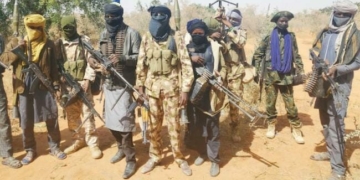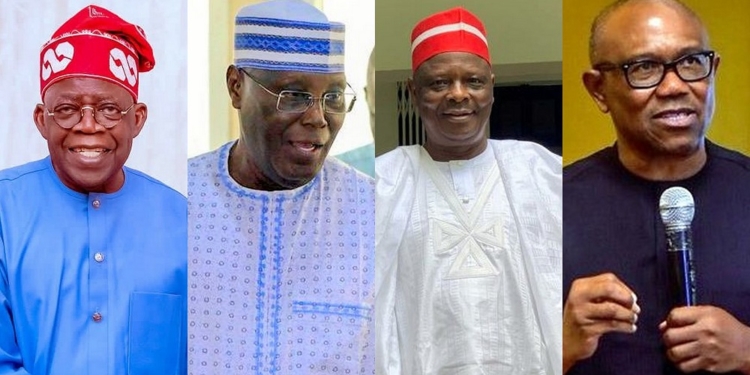A renowned international body, Fitch Solutions Country Risk and Industry Research, has predicted that the All Progressives Congress’ (APC) Presidential candidate, Asiwaju Bola Tinubu, will win Nigeria’s presidential election this month.
Fitch’s report, released on 1 February 2023, did not rule out the possibility of a run-off, which it stated is increasing.
Tinubu (APC), Atiku Abubakar (PDP), and Peter Obi (LP) are the three main presidential candidates in Nigeria’s 25 February 2023 presidential election.
“At Fitch Solutions, we maintain our view that the All Progressives Congress’s Bola Ahmed Tinubu is most likely to win Nigeria’s February 2023 presidential election,” the report said.
“We anticipate that domestic insecurity will rise following the election as the vote will likely aggravate existing security challenges. In addition, a Tinubu victory would end Christian-Muslim alternation of the presidency and thereby increase social instability,” it added.
The report also foreclosed protests and a divided legislature that will prevent a Tinubu presidency from implementing significant economic reforms, such as a removal of fuel subsidies or a simplification of the exchange rate system.
Fitch said while the election has traditionally been between the APC and the Peoples Democratic Party (PDP), the 2023 presidential vote would be three-horse race for the first time since Nigeria’s 1999 return to democracy.
This, it said, was due to the popularity of the Labour Party’s Peter Obi, especially among Nigeria’s urban and affluent voters.
“We believe that the Labour Party’s rise in popularity is likely to split the opposition vote, favouring the ruling APC. Indeed, we expect that Obi — a Christian from the South East — will do well in states in Nigeria’s South East and South South regions, which traditionally have been PDP strongholds.
“A January 2023 study conducted by SBM Intelligence — a local firm — showed a notable rise in new voters in Edo, Ebonyi and Anambra, all South Eastern states where we expect Obi will obtain a large share of the vote. This suggests that the Labour party is likely to win these states at the expense of the PDP — thus Splitting the opposition vote,” the report analysed.
Fitch said it expected that the demographic dominance of Nigeria’s Muslim-majority, as the North would benefit the APC.
“Northern votes accounted for 64.7% of total votes in the 2019 presidential election and given that the APC will likely remain popular in Northern states — in part due to Tinubu’s dual Muslim ticket — this will give Tinubu an advantage over other candidates. In addition, we expect that Tinubu will benefit from the APC’s incumbency advantages and his political experience,” it added.
Meanwhile, Fitch said it believed that domestic insecurity would increase in the run-up and aftermath of the election.
“This view is informed by two key reasons. First, public safety and security have worsened in recent years, especially in the North West due to bandit-related violence and the South East due to separatist activity. Anti-government sentiment has been on the rise, illustrated by protests against fuel scarcity across the country in January 2023.
“We believe that a closely fought election will likely aggravate these existing security challenges and amplify partisan and factional tensions. Second, a Tinubu victory would break with the unwritten tradition that Nigeria’s presidency rotates between Muslims and Christians.
“As such, we expect that a Tinubu win will increase perceived marginalisation among Christians, while Obi supporters are likely to question the fairness of the electoral process, especially after online polls have predicted a win for Obi,” it predicted.
The Fitch’s report also expected the APC to retain its majority in both Senate and the House of Representatives in legislative elections, which are held on the same day as the presidential vote.
“This view is largely informed by the fact that split-ticket voting (voting for candidates from different political parties) remains uncommon in Nigeria. Indeed, in previous elections, the presidential vote share was roughly in line with the distribution of seats in both the House of Representatives and Senate.
“As such, the party that won the presidency has always obtained the most seats in both houses of the assembly. Even so, we expect that policymaking will remain slow given ongoing divisions within the APC, which is reflected in Nigeria’s low “Policy-making process” score of 36.7 in our STPRI,” Fitch argued.
It further believed that reform progress would remain weak under a Tinubu presidency, saying despite Tinubu’s claims that he would phase out Nigeria’s costly fuel subsidy and reform the exchange rate regime, “we believe that high inflation — which we will average 18.0% y-o-y in 2023 — and limited appetite within the APC will prevent him from doing so in the short term. In addition, the expected increase in anti-government protests following a Tinubu victory will likely discourage policymakers from implementing unpopular reforms in 2023.”
On the Risks To Outlook, Fitch noted that there is a growing risk that the presidential election would, for the first time in Nigerian history, go to a run-off.
It said due to Obi’s popularity, there is a possibility that none of the candidates meet the electoral threshold that stipulated that a president could only be elected if they both received the majority of overall votes and over 25.0% of votes in at least 24 of Nigeria’s 36 states.
“A run-off would probably pit Tinubu against the PDP’s Atiku Abubakar, and would likely be very close. In this scenario, we would expect the supporters of the third-placed candidate to question the integrity and fairness of the electoral process, which would likely lead to largescale protests which could challenge Nigeria’s already precarious security situation.
“Given that the second round would have to be conducted within three weeks after the first vote, social unrest and insecurity would persist for a longer period of time, which we believe would have negative implications for economic activity,” Fitch foreclosed.










Discussion about this post